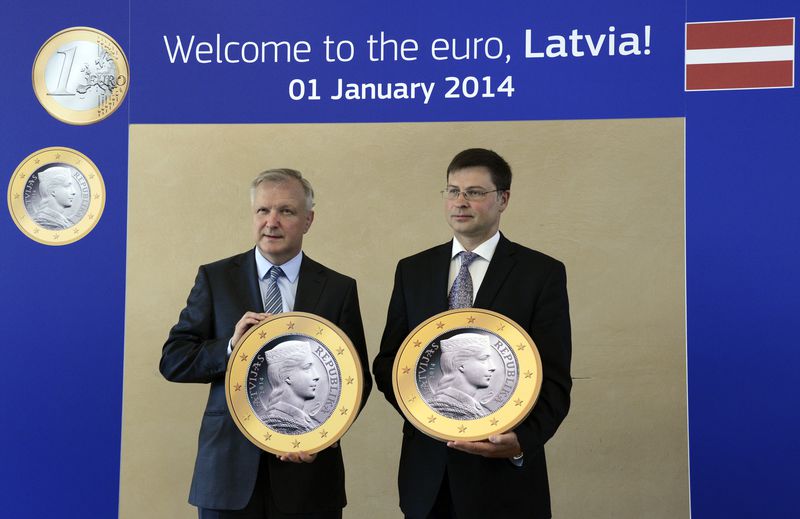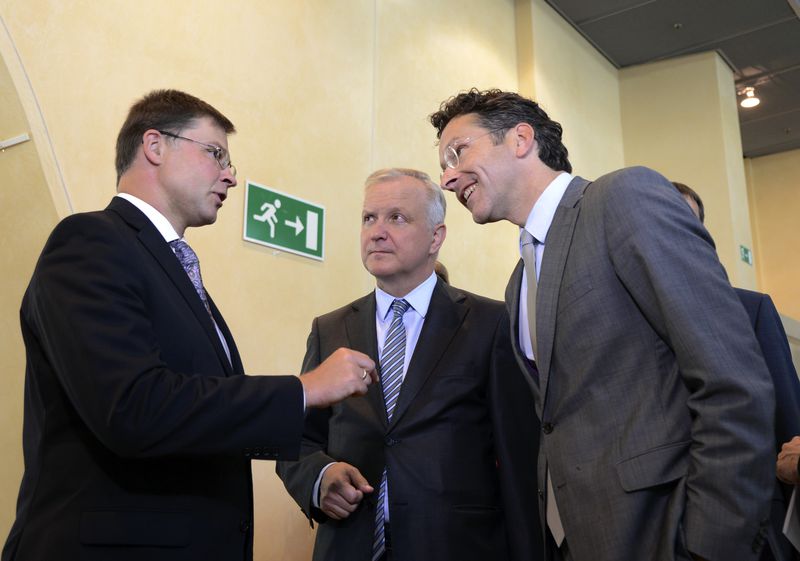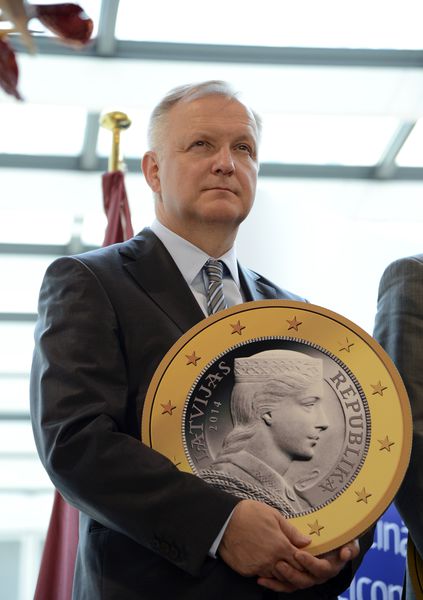Latvia Has Completed Its European Integration
Adelina Marini, July 11, 2013
 Many ask the question why does Latvia need to join the eurozone at a time when this is hardly the most attractive club against the backdrop not only of the temporarily abating debt crisis, but also the differences about its future. This, of course, is hard to understand for countries that have not lived through or have lived through a long time ago their independence and the desire to integrate with nations with whom they share common values. By all means, this is precisely what lies within Latvia's desire not to give up its efforts to prepare for a full fledged membership in the euro area aside from the commitment it took with the signature of the accession treaty. On July 9th, the EU finance ministers gave their final approval to Latvia's application and in this way, on January 1st 2014, the eurozone will expand to 18 members. The last enlargement was in 2011 when another Baltic tiger joined - Estonia.
Many ask the question why does Latvia need to join the eurozone at a time when this is hardly the most attractive club against the backdrop not only of the temporarily abating debt crisis, but also the differences about its future. This, of course, is hard to understand for countries that have not lived through or have lived through a long time ago their independence and the desire to integrate with nations with whom they share common values. By all means, this is precisely what lies within Latvia's desire not to give up its efforts to prepare for a full fledged membership in the euro area aside from the commitment it took with the signature of the accession treaty. On July 9th, the EU finance ministers gave their final approval to Latvia's application and in this way, on January 1st 2014, the eurozone will expand to 18 members. The last enlargement was in 2011 when another Baltic tiger joined - Estonia.
The civilisational choice
Latvia will be the second former Soviet republic to become a member of the EU core - the eurozone. And next year it is expected the third to complete that path - Lithuania, which first of the three small Baltic whelps took over the rotating presidency of the EU Council. In Brussels, for the official decision arrived Latvia's Prime Minister Valdis Dombrovskis who said at a special news conference that Latvia walked a long way and this was a good day for the country and Europe. Minister of Finance Andris Vilks added that July 9th was a very important day for Latvia because "it's not just a technical issue switching from one currency to another. It's very symbolic meaning of this day because we are completing our integration to the core Europe actually. That's extremely important for us. And actually we set these goals already after gaining independence in 1991 ...".
The economic side of membership
Except the political side of things, the introduction of the common European currency has an economic impact as well. As Premier Dombrovskis explained, the accession will have a positive effect on Latvia because it will facilitate the economic development in many ways through reducing interest rates, reducing currency exchange costs, attracting foreign investors for whom it will be easier to calculate the benefits. The officially set exchange rate of the euro to the lats has been agreed by Ecofin at 0.702804 lats per euro. Finance Minster Vilks explained that, in fact, the introduction of the euro proved to be a much more complicated task than the accession to the EU and Schengen because of the severe crisis the country suffered in the beginning of the financial crisis. But in only 3-4 years, Latvia has managed not only to overcome the crash, it also turned into the fastest growing economy, thus deserving the nickname a 'Baltic tiger'.
The lessons from the crisis have been learnt and currently Latvia is much better prepared for the common currency than before, Mr Vilks believes. Premier Dombrovskis explained that in terms of exchange rate, Latvia is in a much better situation than a majority of eurozone members because most of them introduced the single currency with a lower than the euro nominal which led to price spikes. In Latvia, this could be avoided because the value of the lats is much higher than the euro at the moment.
In spite of the Riga's good achievements, the Latvian story is not as pink as it looks like. According to the European Central Bank report for the economic convergence of Latvia, there are several risks facing the country. One of them is inflation. For the period May 2012 until April 2013 the average year-on-year inflation was 1.3% which is way below the reference value of price stability in the eurozone of 2.7%. The problem is, however, that according to the ECB, in the past ten years inflation, measured by consumer prices, was too volatile and varied between average -1.2% to 15.3%. This is a reflection of the strong periods of boom and bust the country suffered, as well as to the high macro economic instability. The ECB expects that inflation will increase, but Minister Vilks quoted forecasts of his ministry and the central bank of Latvia, according to which inflation will vary next year between 2 and 2.5%. The same values are expected to be maintained in 2015 and 2016.
All in all, the ECB is of the opinion that Latvia is within the framework of criteria for economic convergence, but in the long run the sustainability of that convergence causes concern. To avoid those concerns come true, the bank recommends the government in Riga to continue with the fiscal  consolidation, not to lose the achieved in the past years competitiveness and to avoid again increasing the unit labour costs.
consolidation, not to lose the achieved in the past years competitiveness and to avoid again increasing the unit labour costs.
At this stage, the economic growth plays on the side of the criteria of the Economic and Monetary Union (EMU). The forecasts for this year project growth to be 3.8% and next year 4.1%, which is an enviable rate compared to all the other EU member states. Latvia, though, is among the countries with unemployment above 10%. For the past year, the number of unemployed in Latvia was 13.3%. This year it is expected this number to drop to 11.8% and next year to 10.5%. Due to Latvia's economic condition and the ECB's concerns, the European Parliament abandoned its usual tone of resistance to the consolidation measures and recommended in its special resolution on Latvia the government to continue with its fiscal policy. In the resolution, approved by 613 MEPs, it is pointed out that the price stability in Latvia is too dependent on the dynamics of commodity prices because of low energy efficiency and high level of energy imports from a single supplier.
The Europarliament is also concerned with the low support of Latvian citizens for the adoption of the euro. Premier Dombrovskis, however, was an optimist and said that by the time of accession support will improve significantly. According to him, support is already improving as a result of the communication campaign the government has launched six months ago. The first phase of the campaign was entirely explanatory - why is it necessary to join, the essence of the crisis in the eurozone and that, in fact, this is not a crisis of the euro. A second phase is to begin which will focus on the practical sides of accession - how will the savings in bank accounts transform into euros, what will happen to prices, how will the euro affect cash payments. "I think it's realistic that by the time we actually join eurozone on January 1st, majority of the population would support this decision", the Latvian prime minister said.
With what indicators is Latvia joining the eurozone?
The overall government deficit in 2012 was 1.2% of GDP which is a significant drop from 2011 when it was 3.6%. The structural deficit was 0.3% in 2012. The government debt was 40.7% in 2012, but it is expected to grow by more than 2 percentage points this year. In terms of the biggest concerns that Latvia could prove to be another Cyprus, Premier Dombrovskis said that those speculations were unfounded, although the Commission and the ECB required enhanced monitoring over the financial sector. Latvia's financial market is 130% of GDP which is well below the EU average of 360-370% of GDP. To compare, before the crisis the Cypriot financial sector was around 700-800% of gross domestic product. With regard to the size of the Russian capital in Latvian banks, the prime minister pointed out that the banks where there are more non-resident deposits are with higher capital adequacy and liquidity requirements. The capitalisation of the banking sector in the country is well above the EU average, assured Dombrovskis.
Latvia is not among the excellent performers in terms of credit rating, but currently it is assessed by the big credit rating agencies quite positively. Moody's gives BBa2 with a positive perspective; Standard& Poor's assess the country a bit higher - BBB+ with a stable perspective; Fitch is with a plus less - BBB with a stable perspective. The Latvian authorities do not expect any shocks from the adoption of the euro because they are following very carefully Estonia's steps whose euro introduction went on smoothly and without problems in 2011.
What is Latvia's receipt?
It was revealed earlier this year by Minister Vilks and the governor of the country's central bank Ilmars Rimsevics during their hearing in the economic committee of the European Parliament: "speed, ownership, commitment, solidarity and partnership with the social partners". The key, however, is in admitting that this is practically a completion of the process of European integration. A path which Latvia walked steadily and without hesitation whether this is the right choice. The low support for the common currency (40 per cent) is stemming not from hesitation that this is the right strategic choice, but from fears that the uncertainty in the eurozone could drag the country into another crisis that the Latvian citizens paid dearly. In this sense, Latvia's participation in the eurozone rescue fund (ESM) will be for the first five years 40 million euros per year. The overall amount of Latvia's solidarity manifestation will be  320 million euros. On the occasion of the "rightfulness" of choice, Bulgarian political scientist Vladimir Shopov told euinside:
320 million euros. On the occasion of the "rightfulness" of choice, Bulgarian political scientist Vladimir Shopov told euinside:
"Until recently we were thinking of the membership in Schengen and the euro area as of a simply a continuation, a completion of the integration process, a final leg of a steady process of accession to the core of Europe. The reality, however, is that more and more, especially the accession in the eurozone, acquires a strategic character. The economic calculation of benefits and damages as well as the timeline of the process begin to give way to another type of considerations. The membership in the zone will intertwine even deeper the economic policy of the country, which has a potential not just to compensate partly the complete governing mediocrity of a series of Bulgarian governments, but also to structure some kind of an agenda for reforms that an oligarchised economy simply cannot do. In other words, the accession to the eurozone has the potential of a resource that can shift the economy strategically and modernise it against the backdrop of its current structure and domination of oligarchic models. And in case of a possible bailout, the country could pass on 'manual control' and be forced to do certain reforms. This perspective toward membership could be too Bulgarian, but from now on it is one of the few options for at least partial deoligarchisation of the country".
 Federica Mogherini | © Council of the EU
Federica Mogherini | © Council of the EU | © Council of the EU
| © Council of the EU Luis De Guindos | © Council of the EU
Luis De Guindos | © Council of the EU Klaus Regling | © Council of the EU
Klaus Regling | © Council of the EU Mario Centeno | © Council of the EU
Mario Centeno | © Council of the EU Mario Centeno | © Council of the EU
Mario Centeno | © Council of the EU